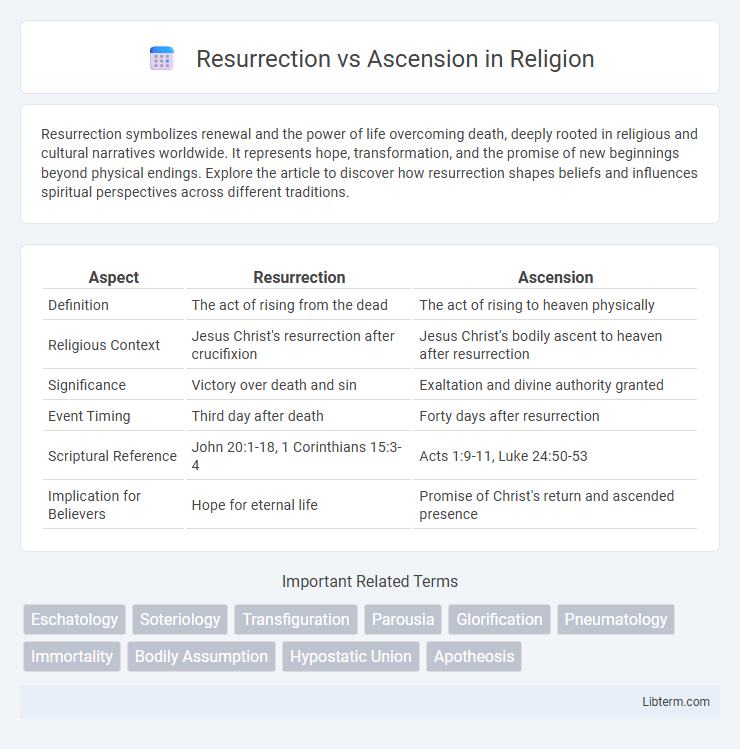Resurrection symbolizes renewal and the power of life overcoming death, deeply rooted in religious and cultural narratives worldwide. It represents hope, transformation, and the promise of new beginnings beyond physical endings. Explore the article to discover how resurrection shapes beliefs and influences spiritual perspectives across different traditions.
Table of Comparison
| Aspect | Resurrection | Ascension |
|---|---|---|
| Definition | The act of rising from the dead | The act of rising to heaven physically |
| Religious Context | Jesus Christ's resurrection after crucifixion | Jesus Christ's bodily ascent to heaven after resurrection |
| Significance | Victory over death and sin | Exaltation and divine authority granted |
| Event Timing | Third day after death | Forty days after resurrection |
| Scriptural Reference | John 20:1-18, 1 Corinthians 15:3-4 | Acts 1:9-11, Luke 24:50-53 |
| Implication for Believers | Hope for eternal life | Promise of Christ's return and ascended presence |
Understanding Resurrection: Definition and Origins
Resurrection refers to the act of rising from the dead, primarily rooted in religious contexts such as Christianity, where Jesus Christ's resurrection signifies victory over death and the promise of eternal life. Originating from ancient Jewish traditions and early Christian theology, resurrection embodies the concept of a physical and spiritual renewal beyond mortal existence. This foundational belief distinguishes resurrection from ascension, which involves a being rising to heaven, emphasizing transformation rather than a return to earthly life.
The Concept of Ascension: A Theological Overview
Ascension in Christian theology refers to Jesus Christ's bodily rising to heaven 40 days after his Resurrection, signifying his exaltation and divine authority as the Son of God. This event marks the completion of the earthly mission and the beginning of Christ's heavenly reign, emphasizing the transition from human suffering to divine glorification. The Ascension underscores key doctrines of Christ's mediatory role, the promise of the Holy Spirit, and the pathway for believers' own future resurrection and glorification.
Scriptural References: Resurrection in Sacred Texts
Resurrection in sacred texts, such as 1 Corinthians 15:3-4 and Matthew 28:5-7, highlights Jesus Christ rising from the dead on the third day, affirming victory over sin and death. John 11:25 emphasizes resurrection as Jesus declares, "I am the resurrection and the life," underscoring the promise of eternal life for believers. The resurrection is central to Christian faith, symbolizing hope, renewal, and God's power to restore life.
Scriptural Insights: Ascension Narratives Across Religions
Ascension narratives appear prominently in Christian scripture, notably in Luke 24:51 and Acts 1:9, where Jesus' return to heaven signifies divine authority and fulfillment of prophecy. Similar motifs of ascension, symbolizing transcendence and divine approval, are found in Islamic texts describing Prophet Muhammad's Night Journey (Isra and Mi'raj) documented in Surah Al-Isra 17:1 and Hadith collections. Comparative analysis reveals ascension as a universal theological theme underscoring spiritual elevation and connection between the earthly and the divine across religious traditions.
Key Differences between Resurrection and Ascension
Resurrection refers to Jesus Christ rising from the dead after crucifixion, signifying victory over death and the promise of eternal life, occurring on the third day as described in the New Testament. Ascension denotes Jesus' bodily departure into heaven forty days after the Resurrection, marking his return to divine glory and the completion of his earthly mission. The key difference lies in Resurrection being the restoration to life, while Ascension is the transition from earthly life to heavenly presence.
Symbolism and Spiritual Significance
The Resurrection symbolizes victory over death and the promise of eternal life, reflecting renewal, hope, and the transformative power of divine grace. The Ascension signifies Christ's exaltation and the bridge between heaven and earth, representing the completion of His earthly mission and the promise of His return. Together, these events emphasize the core spiritual themes of redemption, divine authority, and the believer's future resurrection.
Resurrection in Christian Doctrine
Resurrection in Christian doctrine signifies Jesus Christ rising from the dead on the third day after crucifixion, affirming his victory over sin and death and validating the promise of eternal life for believers. This event is foundational to Christian faith, symbolizing new life and God's power to redeem humanity. The Resurrection emphasizes physical, bodily rising, distinguishing it from the Ascension, which describes Christ's return to heaven forty days later.
Ascension in Various Religious Traditions
Ascension, interpreted as the act of rising to a higher spiritual state or realm, features prominently across various religious traditions such as Christianity, Islam, and Hinduism. In Christianity, the Ascension of Jesus symbolizes his exaltation and return to divine glory after resurrection, signifying hope for believers' own spiritual elevation. Islamic tradition recognizes the Mi'raj, the Prophet Muhammad's ascension to heaven, representing a profound spiritual journey and divine communication, while Hindu texts describe the ascension of sages and deities to higher planes, reflecting liberation and enlightenment.
Contemporary Interpretations and Debates
Contemporary interpretations of the Resurrection emphasize its role as a symbol of spiritual renewal and hope across diverse Christian denominations, often debated in the context of historical versus metaphorical understandings. The Ascension is explored through theological discussions on Jesus' divine authority and the transition from earthly ministry to heavenly reign, with some scholars questioning its literal event versus its representational meaning. Debates frequently center on the implications of both events for Christian doctrine, soteriology, and eschatology, highlighting their evolving significance in modern faith communities.
Resurrection vs Ascension: Impact on Faith and Belief
Resurrection affirms the triumph over death, offering believers hope in eternal life and reinforcing the foundation of Christian faith. Ascension signifies Jesus' exaltation and divine authority, inspiring trust in His ongoing spiritual presence and impending return. Together, Resurrection and Ascension shape core doctrines that deepen believers' conviction and commitment.
Resurrection Infographic

 libterm.com
libterm.com